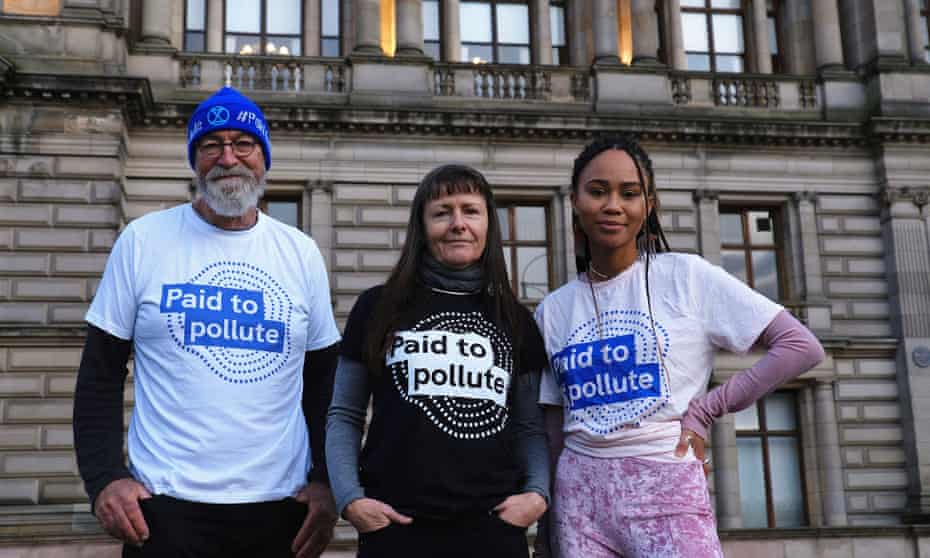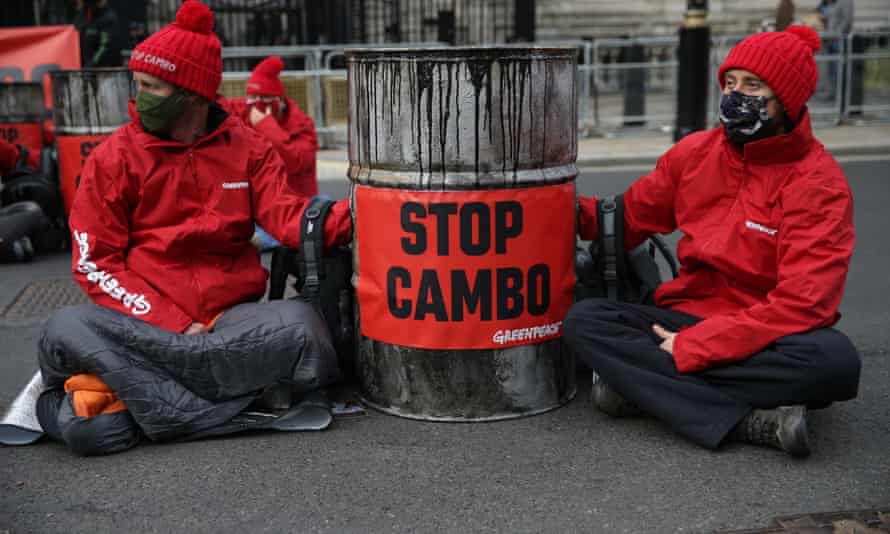Climate campaigners claim the government is giving billions of pounds in subsidies to oil and gas producers

Jeremy Cox, Kairin van Sweeden and Mikaela Loach from the environmental campaign group Paid to Pollute are mounting a high court challenge this week.
Robin McKie
Robin McKie
THE GUARDIAN
Science Editor
Sat 4 Dec 2021
Environmental campaigners will this week ask the high court to rule that the government’s fossil fuel strategy is unlawful, in a case that could undermine the UK’s claim to be leading the fight against climate change.
The campaigners will argue that the government is effectively subsidising oil and gas production with billions of pounds in handouts, which conflicts with its legal duty to achieve net zero emissions by 2050.
Pressure group Paid to Pollute says oil and gas companies received billions of pounds in tax relief for new oil and gas exploration, and billions more towards decommissioning costs between 2016 and 2020. The group says this amounts to fossil fuel subsidies.
“Public money is supporting businesses that contribute to the climate crisis instead of solving it,” said Kairin van Sweeden, one of three activists who will appear in court. “We have to challenge this deadly use of the public purse. If the Oil and Gas Authority won’t use common sense, perhaps it’ll listen to the courts.”

Sat 4 Dec 2021
Environmental campaigners will this week ask the high court to rule that the government’s fossil fuel strategy is unlawful, in a case that could undermine the UK’s claim to be leading the fight against climate change.
The campaigners will argue that the government is effectively subsidising oil and gas production with billions of pounds in handouts, which conflicts with its legal duty to achieve net zero emissions by 2050.
Pressure group Paid to Pollute says oil and gas companies received billions of pounds in tax relief for new oil and gas exploration, and billions more towards decommissioning costs between 2016 and 2020. The group says this amounts to fossil fuel subsidies.
“Public money is supporting businesses that contribute to the climate crisis instead of solving it,” said Kairin van Sweeden, one of three activists who will appear in court. “We have to challenge this deadly use of the public purse. If the Oil and Gas Authority won’t use common sense, perhaps it’ll listen to the courts.”

Members of Greenpeace protest outside Downing Street against the Cambo oilfield off Shetland in October. Photograph: Anadolu Agency/Getty Images
The hearing comes as controversy mounts over the UK oil and gas industry’s attempts to gain approval for more than a dozen new schemes, even though scientists say new investment in oil and gas projects must stop if governments are to tackle the climate crisis.
Earlier this year, John Gummer, chairman of the Climate Change Committee, told MSPs in Holyrood the “justification for any new oil and gas exploration or production has to be very, very, very strong and I cannot say I’ve so far seen any such evidence”.
Last week, one of the most controversial projects, the Cambo oilfield off Shetland, was abandoned by Shell, plunging the future of oil exploration in the area into doubt. Climate campaigners hailed this as the beginning of the end for the North Sea industry. Greenpeace said the damage from Cambo would have been the equivalent of running 18 coal-fired power stations for a year.
“It’s vital that the UK demonstrates leadership and shows how countries can transition away from oil and gas while reskilling workers and creating thousands of well-paid jobs in the process,” said another claimant, Mikaela Loach. “All of this starts with the government pulling the plug on the millions it gives to big polluters.”

Environmentalists warn of close ties between oil and gas sector and UK’s North Sea regulator
This view was backed by Jeremy Cox, a former oil refinery worker and the third claimant in the action. “Using public money to subsidise continued extraction and support a declining industry is the exact opposite of what this government should be doing.”
A government spokesperson said the UK did not pay any fossil fuel subsidies: “No other significant oil and gas-producing nation has gone as far as the UK in supporting the sector’s gradual transition to a low-carbon future, as demonstrated by our North Sea transition deal.
“While we are backing the UK’s transition to green energy, there will be ongoing but diminishing need for oil and gas over the coming years, as recognised by the independent Climate Change Committee.”
The hearing comes as controversy mounts over the UK oil and gas industry’s attempts to gain approval for more than a dozen new schemes, even though scientists say new investment in oil and gas projects must stop if governments are to tackle the climate crisis.
Earlier this year, John Gummer, chairman of the Climate Change Committee, told MSPs in Holyrood the “justification for any new oil and gas exploration or production has to be very, very, very strong and I cannot say I’ve so far seen any such evidence”.
Last week, one of the most controversial projects, the Cambo oilfield off Shetland, was abandoned by Shell, plunging the future of oil exploration in the area into doubt. Climate campaigners hailed this as the beginning of the end for the North Sea industry. Greenpeace said the damage from Cambo would have been the equivalent of running 18 coal-fired power stations for a year.
“It’s vital that the UK demonstrates leadership and shows how countries can transition away from oil and gas while reskilling workers and creating thousands of well-paid jobs in the process,” said another claimant, Mikaela Loach. “All of this starts with the government pulling the plug on the millions it gives to big polluters.”

Environmentalists warn of close ties between oil and gas sector and UK’s North Sea regulator
This view was backed by Jeremy Cox, a former oil refinery worker and the third claimant in the action. “Using public money to subsidise continued extraction and support a declining industry is the exact opposite of what this government should be doing.”
A government spokesperson said the UK did not pay any fossil fuel subsidies: “No other significant oil and gas-producing nation has gone as far as the UK in supporting the sector’s gradual transition to a low-carbon future, as demonstrated by our North Sea transition deal.
“While we are backing the UK’s transition to green energy, there will be ongoing but diminishing need for oil and gas over the coming years, as recognised by the independent Climate Change Committee.”
No comments:
Post a Comment